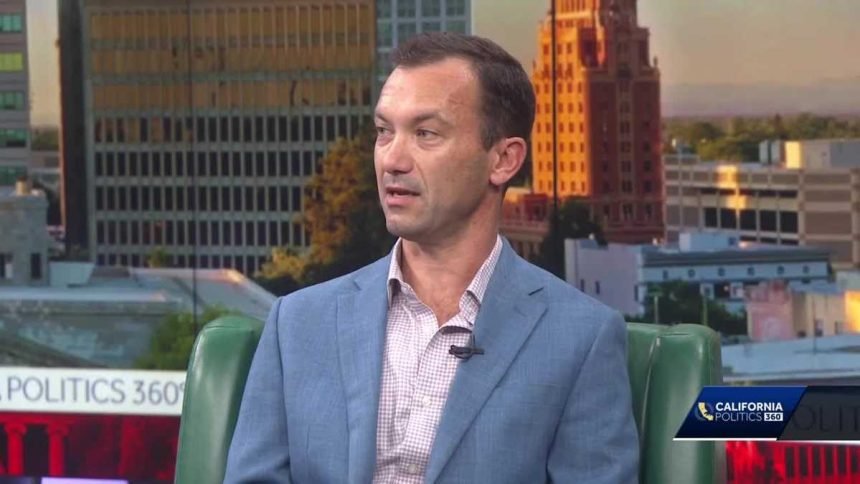California Politics 360: Did state lawmakers help bring down the cost of groceries?
Welcome back to California Politics 360. This year, political leaders promised to help lower grocery prices for shoppers, but prices nationwide have continued to strain household budgets, and it’s been no different here in California. Taking *** look at the latest numbers from the Bureau of Labor Statistics over the year, the grocery food index in San Francisco. Up 4% in Los Angeles, up more than 3%. San Diego up 4%. Joining us now to take *** look at these numbers is Daniel Conway with the California Grocers Association. Thank you so much for being with us. Thank you for having me this morning, Ashley. So first, with this promise from California lawmakers on affordability, how did they do when it comes to these grocery prices? You know, to be fair, it was *** mixed bag, right, so to speak, um, on the one hand, uh, there was *** lot of good intentions, but I think what we saw ultimately come out of the legislature this year was, was, uh, underwhelming, and I say that because, uh, we saw legislation move forward that did things like regulate self checkout right? California already has the most regulated self check out in the country. This would have required staffing, uh, or. Would have added staffing requirements would have put restriction on the items, uh, that bill moved very far through the process before finally getting stopped at the end. We saw another bill, uh, focused on what’s called surveillance pricing, but essentially how data is used to provide discounts, and this bill ultimately would have had the effect of, uh, basically undermining loyalty programs and customer rewards. So basically the discounts that everyone enjoys at the grocery store would have gone away. Those two bills were ultimately stopped, but that was 8 months into the process after *** lot of work by people like me, right? Meanwhile, we had *** *** piece of legislation that would have reduced credit card fees, uh, and that bill couldn’t even make it out of the banking committee, right? And so, when you see it’s the difference between like actions and words, right? And so I, I believe the intentions of our legislators, but I also think this, you know, culture of regulation is just so ingrained in the capital that it’s really hard to kind of move away from that. California has the highest grocery prices in the nation. What contributes to that? I mean if you think about it, uh, what contributes to our grocery prices are the same things that make it so expensive for us to live in California, right? It’s the cost of real estate, it’s the cost of utilities, it’s the cost of gas, right? It’s all of those inputs. But then on top of that here in California again it’s these additional regulations that I think just compound those effects, um, and I think what’s important to think about is right. On one hand, we need regulations for for health and safety and things like that, but I think the reality is when you have *** legislature that puts out 1200 new laws *** year, we’re kind of going beyond that, and I think that’s where we get nervous and we think, you know, ultimately you’re not going to be able to regulate your way out of affordability. All right, Daniel Conway, thank you so much for being with us. We’ll be right back.
California lawmakers this year promised to focus on the cost of living and affordability.The latest numbers from the Bureau of Labor Statistics show over the year that the grocery food price index is up about 4% in San Francisco, Los Angeles and San Diego. Daniel Conway with the California Grocers Association joined California Politics 360 to discuss how lawmakers did when it comes to grocery prices. “To be fair, it was a mixed bag,” Conway said, noting numerous proposals that would have placed more regulations on grocery and convenience stores in the state made it close to the legislative finish line. Ultimately, they were stopped.(See the full Sept. 14 episode of California Politics 360 below.)Conway noted lawmakers early this year stopped a proposal to end credit card swipe fees that he said could have helped. California has the highest grocery prices in the nation. Conway pointed to the state’s cost of real estate, utilities, gas, plus additional regulations that he says compound those effects. He noted California lawmakers pass about 1,200 new laws a year. “You’re not going to regulate affordability,” Conway said.See more coverage of top California stories here | Download our app | Subscribe to our morning newsletter | Find us on YouTube here and subscribe to our channelCalifornia Politics 360 airs Sundays on KCRA 3 at 8:30 a.m. See more stories from the show here.
California lawmakers this year promised to focus on the cost of living and affordability.
The latest numbers from the Bureau of Labor Statistics show over the year that the grocery food price index is up about 4% in San Francisco, Los Angeles and San Diego.
Daniel Conway with the California Grocers Association joined California Politics 360 to discuss how lawmakers did when it comes to grocery prices.
“To be fair, it was a mixed bag,” Conway said, noting numerous proposals that would have placed more regulations on grocery and convenience stores in the state made it close to the legislative finish line. Ultimately, they were stopped.
(See the full Sept. 14 episode of California Politics 360 below.)
Conway noted lawmakers early this year stopped a proposal to end credit card swipe fees that he said could have helped.
California has the highest grocery prices in the nation. Conway pointed to the state’s cost of real estate, utilities, gas, plus additional regulations that he says compound those effects.
He noted California lawmakers pass about 1,200 new laws a year.
“You’re not going to regulate affordability,” Conway said.
See more coverage of top California stories here | Download our app | Subscribe to our morning newsletter | Find us on YouTube here and subscribe to our channel
California Politics 360 airs Sundays on KCRA 3 at 8:30 a.m. See more stories from the show here.











